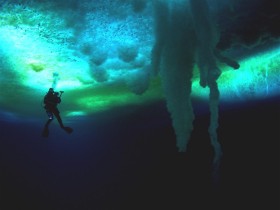


Idfa 2013/ awards/ 2
So, see below, the juries have made their choices at the idfa 2013 edition. In most of the sections nominations had been made in beforehand with 3 films competing. It is a good rule as it means something for a film to have ”nominated for… at idfa 2013” on its track record. I profited from the privileged access I have to Docs for Sale at idfa, when the nominations had been announced and watched the three films in the feature-length competition: ”Ai Weiwei The Fake Case” (Photo) by Andreas Johnsen, ”Ne me Quitte Pas” by Niels van Koevorden and Sabine Lubbe Bakker, and the winner (see below the full list of winners) ”Song from the Forest” by Michael Obert. In beforehand I had seen Svetoslav Draganov’s ”Life Almost Wonderful”, the warm and moving film about three brothers with a hard background but with a strong appetite for life, ”The Wild Years” by Catalan Ventura Durall, an equally touching interpretation of the tough lives of street children in Ethiopia – and finally the masterpiece ”Return to Homs” by Syrian Talal Derki, reviewed on this site. 6 films out of 16, of course not enough for me to constitute a one-man jury, but enough to put down some impressions on the three nominated films.
The winner, ”Song from the Forest”, has an absolutely wonderful main character Louis Sarno, charismatic, sympathetic and his contribution to the collect of music from the pygmies is admirable and extraordinary. To see and listen to him is great, and there is a lot to get from his travel with the son, whereas it irritates when the filmmaker in the beginning of the story, as a kind of selling tool, brings in Jim Jarmusch to tell us how magnificent Louis and how apartheid is still to be found everywhere, there are other show-stoppers like that along the way.
”Ne Me Quitte Pas”, on the contrary, never leaves the main road in its following Bob and Marcel, both strong alcoholics, left by family for the same reason I guess, but they have each other’s drinking company and conversations, which often are about committing suicide. Marcel decides to go for rehabilitation, we follow that, Bob comes to visit, as do Marcel’s children at his home, quite touching scenes, the two of them are nice people to get to learn, both, as said precisely in the catalogue, have seen their lives slip through their fingers. The film has a rhythm. Sad and warm at the same time.
”Ai WeiWei The Fake Case” is the best film about the Chinese controversial world artist that I have seen. It is quite a scoop that the young director has been let into the house/studio and appartment of the artist at a period, where he was on bail after three months in jail and where he was forbidden to give interviews. Sequence by sequence you are invited to experience the world of the artist, he is with his family (sweet scenes with him and his little boy), he talks with his staff, he takes constantly photos with his cell phone, he has a beautiful conversation with his old mother, who tells him that all what he does, he does because he has got it from her and his father (who was also unpopular with the regime), and that she thinks he is using too harsh words against about China. You see a calm person but the director/cameraman succeeds to get that close to him that you sense a pain that can easily explode – and it does in a scene where Ai WeiWei sees how one of his employed has been beaten by the police outside his house. He rushes to the policemen and attacks them.
I have seen films from the other categories, I will return to them, as well as to the film by Khalo Matabane, ”A letter to Nelson Mandela”.
